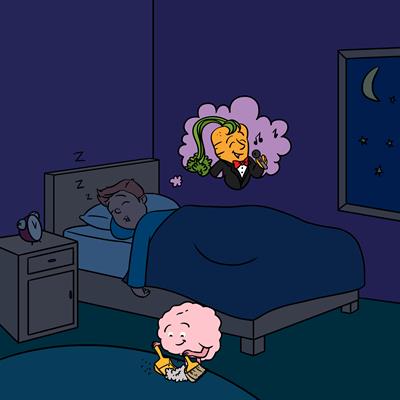
You Snooze, You DON’T Lose – What is Sleep and Why is it so Crucial? ..
Collection Editors
Frontiers for Young MindsViews
426,486 viewsParticipating Sections
Submission Deadline
Closed
Articles

Human Health
20/04/2021
Daily Rhythms of the Body and the Biological Clock
Authors
Tamar Shochat, Eran Tauber
Human Health
01/12/2020
The Superpowers of Our Sleep
Authors
Laetitia S. Gaspar, Bárbara Santos, Ana Teresa...
Neuroscience and Psychology
18/12/2019
The Science of Dreams
Authors
Rebecca M. C. Spencer
Neuroscience and Psychology
02/08/2019
What Can a Blind Fish Teach Us About Sleep?
Authors
Alexandra Paz, Alex C. Keene
Neuroscience and Psychology
05/02/2019
How Do Our Cells Tell Time?
Authors
Katharine F. Addison, Julia Jade Harris
Neuroscience and Psychology
22/06/2018
Do House-Elves Clean Your Brain While You Sleep?
Authors
Ken A. Paller
Neuroscience and Psychology
24/04/2014
Scientific Significance of Sleep Talking
Authors
David Peeters, Martin Dresler
Neuroscience and Psychology
13/11/2013
Why Sleep?
Authors
Dara S. Manoach, Robert StickgoldAbout this collection
We spend an incredible amount of time sleeping – probably more time than we spend on doing anything else. This retrospective Collection of 8 articles takes a deep dive into sleep. Wow your brain and test your knowledge with this accessible overview of all things sleep(y).The mystery of sleep has kept curious minds awake for millennia. From the times of the Greeks and Romans, people worshipped Gods associated with sleep: Hypnos (also Somnus) and his sons Morpheus, Phobetor and Phantasus – you might be able to see in these names the roots of familiar modern words associated with sleep and dreaming, such as “hypnosis”, “somnambulism” (sleepwalking), “morphine” (a sleep-inducing painkiller) and “fantasies”. Sleep is so important that famous names from William Shakespeare to the Beatles have written about it.
Over the centuries, scientists have begun to solve this mystery. We spend a third of our lives sleeping but not all sleep is the same. As we begin to drift to sleep, our body rests and recharges. However, our brains do not snooze as much. Neurons housekeep during this time: memory processing and finetuning cognitive functions rely on a good night’s sleep. And all this while we dream. Dreams are a common experience: sometimes funny, scary, or downright bizarre, they are a fascinating combination of our inner and outer world! The information processing and self-organisation that the sleeping brain does in our dreaming state is so complex that, before it was well understood, it sparked famous theories such as the psycho-analyst Sigmund Freud’s “Interpretation of Dreams”. Our sleeping brain makes us rest at night, while the quality of sleep energizes us for the day to come.
The first articles in this Collection focus on what makes a good night of sleep, and why it is essential for our well-being and health. Did you know that you actually continue learning while sleeping? A good night's sleep is like a symphony of brain rhythms with each movement serving a different function. Find out why you shouldn't cut it short, and how sleeping disorders sadly do just that.
As you discover the importance of sleep, the second set of articles will let you understand what is happening whilst sleeping. What do our brains do during this time? And how can we study the evolution of sleep? Some populations of Mexican cavefish may hold the answers.
Talking about non-humans: did you know that we are not the only creatures with a fascinating biological clock that is coordinated by the brain? The third set of articles leads us on an adventure back in time, and brings alive the series of experiments that led to the discovery of the biological clock, today known as the circadian rhythm, and how modern life has cut the night short.
And lastly, we have two teaser articles: Have you been curious as to why we dream and how we can investigate dreams? Or have you ever wondered why some people sleep talk and whether this is similar to how we speak whilst awake? Find out in the last two articles of this Collection.
Our Collection will give you plenty of new ideas to dream about!
Would you like to submit to this collection?
For researchers interested in submitting to this Collection, please consult our author guidelines and check that you have all the essentials included before submitting









